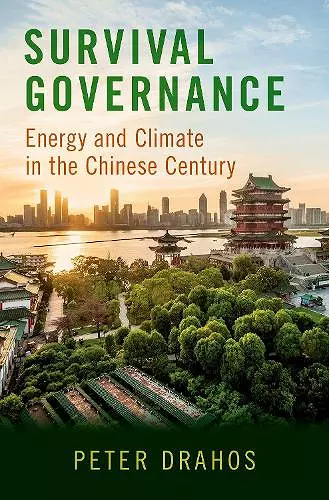Survival Governance
Energy and Climate in the Chinese Century
Format:Hardback
Publisher:Oxford University Press Inc
Published:15th Apr '21
Currently unavailable, and unfortunately no date known when it will be back

To deal with the climate crisis we need a new paradigm of technological and social development aimed at the restoration of ecological systems--the bio-digital energy paradigm--and China is the world power best positioned to lead this change. The climate and energy crisis requires a strong state to change the direction, speed, and scale of innovation in world capitalism. There are only a few possible contenders for catalyzing this governance of survival: China, the European Union, India, and the United States. While China is an improbable leader--and in fact the world's biggest emitter of greenhouse gasses--Peter Drahos explains in Survival Governance why this authoritarian state is actually more likely to implement systemic change swiftly and effectively than any other power. Drawing on more than 250 interviews, carried out in 17 countries--including the world's four largest carbon emitters--Drahos shows what China is doing to make its vast urban network sustainable and why all states must work toward a "bio-digital energy paradigm" based on a globalized, city-based network of innovation. As Drahos explains, America is incapable of reducing the power of its fossil fuel industry. For its part, the European Union's approach is too incremental and slowed by complex internal negotiations to address a crisis that demands a rapid response. India's capacity to be a global leader on energy innovation is questionable. To be sure, China faces hurdles too. Its coal-based industrial system is enormous, and the US, worried about losing technological superiority, is trying to slow China's development. Even so, China is currently urbanizing innovation on a historically unprecedented scale, building eco-cities, hydrogen cities, forest cities, and sponge cities (designed to cope with flooding). This has the potential to move cities into a new relationship with their surrounding ecosystems. China--given the size of its economy and the central government's ability to dictate thoroughgoing policy change--is, despite all of its flaws, presently our best hope for implementing the sort of policy overhaul that can begin to slow climate change.
Drawing on more than 250 interviews, carried out in 17 countries including the world's four largest carbon emitters—Drahos shows what China is doing to make its vast urban network sustainable and why all states must work toward a "bio-digital energy paradigm" based on a globalized, city-based network of innovation. * H. W. Micklitz, Journal of Consumer Policy *
Which political organization is most likely to deal with the potentially disastrous effects of climate change? Peter Drahos argues it is the Chinese Communist Party. This book will be intensively controversial, but if Drahos is right, his book may well be regarded as one of the most important social science works of our time, perhaps even a game changer. * Daniel A. Bell, Professor of Political Science and Public Administration, Shandong University, and author of The China Model: Political Meritocracy and the Limits of Democracy *
Peter Drahos's extremely valuable book highlights two issues that are critical for the future of humanity in the face of climate change: the inescapable role of states in leading capitalism towards radical carbon emissions, and the ability of China to play the most important part in this effort. * Anatol Lieven, Professor of Government, Georgetown University, and author of Climate Change and the Nation State: The Role of Nationalism in a Warming World (Oxford) *
Time is rapidly running out on the race to meet the climate change challenge, and it will very likely be won or lost on geopolitics, not technologies. Could China emerge as the hero in meeting this great challenge? This book explains why China may well be humanity's best hope. * Will Steffen, Emeritus Professor, Fenner School of Environment & Society, the Australian National University *
ISBN: 9780197534755
Dimensions: 155mm x 236mm x 28mm
Weight: 499g
272 pages